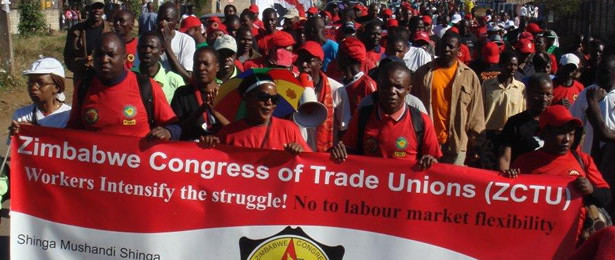
THE Zimbabwe Congress of Trade Unions (ZCTU) on Saturday took to the streets of Harare to demonstrate over the dismissal of workers amid heavy police presence.
Tatira Zwinoira
Approximately 120 people took part in the demonstrations which started in the morning from their offices at Gordon House to Mukwati Building, which houses the Ministry of Public Service,Labour and Social Welfare.
More than 25 000 people have lost their jobs after a recent Supreme Court ruling that employers can fire workers on three months’ notice.
Government reacted by recalling Parliament to pass amendments to the Labour Act. The Labour Amendment Bill was then passed last week by the National Assembly and Senate as a move to protect workers from wanton firing.
The ZCTU successfully obtained a High Court order from High Court judge Justice Garainesu Mawadze interdicting the police from stopping the labour grouping to proceed with their demonstration. The march was peaceful and no one was arrested.
Pockets of baton-wielding riot police were deployed at different points in the central business unit to monitor the demonstrators.
At Mukwati, ZCTU president George Nkiwane addressed the demonstrators who carried placards written, “No to slave trade”, “We have been robbed of our independence” and “We demand job security now.”
- Chamisa under fire over US$120K donation
- Mavhunga puts DeMbare into Chibuku quarterfinals
- Pension funds bet on Cabora Bassa oilfields
- Councils defy govt fire tender directive
Keep Reading
Nkiwane described the amendments to the Labour Act as “worse than what they had expected”.
“We are saying to the government that workers are under siege from all spheres. We are still studying the Bill, but it appears that it is much worse than we expected it to be. The government has a duty to protect the vulnerable workers by moving swiftly, either by using Presidential Powers or ministerial powers as a stop gap measure to protect workers,” he said.
The ZCTU also submitted a petition to the ministry of Public Service, Labour and Social Welfare with a list of demands.
Some of the demands included immediate stoppage to termination of employment contracts by employers. They demanded that government intervenes by ensuring the Labour ministry urgently promulgated regulations to stop job cuts.
Other demands included the need to give more powers to the Labour Court, and to appoint judges to the Constitutional Court different from those sitting at the Supreme Court.
Nkiwane said there was bias in the manner some legislators debated on the Labour Bill, as well as the manner in which the judiciary handled labour issues.
He said the reason was that most of them were employers.
“We once warned you [workers] of the impending introduction nof labour market flexibility and linking wages to productivity.
The employers have now resorted to using the courts to introduce labour market flexibility,” Nkiwane said.
The Labour Amendment Bill has been gazetted and now awaits Presidential assent to become law.











